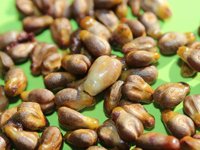It is a horrible thing to receive a diagnosis of colorectal cancer. This is a serious, potentially life-threatening illness that is the second leading cause of cancer-related mortalities for men and women combined. And sometimes the battle to eradicate the malignant cells makes patients feel worse than the disease itself. Toxic chemotherapy agents are delivered to the intestines to kill off the cancer, but they are so deadly that they destroy plenty of healthy tissue along the way as well. But now, new research has found that there may be a natural way to step up the efficiency of the chemotherapy while also minimizing its nasty side effects.
The study, which was conducted at the University of Adelaide in Australia, found that grape seed not only appears to increase the ability of chemotherapy to destroy malignant cells in the colon, but can also protect the body from some of the complications associated with this treatment.1 “Grape seed promise in fight against bowel cancer.” Science Daily. 14 February 2014. Accessed 19 February 2014. http://www.sciencedaily.com/releases/2014/02/140214092004.htm The experiment was performed in a laboratory setting using a commercially available type of grape seed extract. The researchers extracted tannins (which are polyphenols known to help protect from disease) from grape seeds, freeze-dried the extract, and then used it in powdered form.
The grape seed extract was fed to rats with colon cancer whose intestinal cells were then removed and kept in a culture. Using a grape seed concentration of up to 1,000mg/kg along with the chemotherapy drugs, the healthy intestinal tissue present in the culture revealed no presence of side effects. The damage to the normal tissue was markedly less than what was evident in the control samples, which received only chemotherapy without grape seed extract added. Inflammation produced by the chemotherapy was approximately 55 percent lower in the grape seed samples. In addition, the grape seed augmented the ability of the chemotherapy to inhibit growth in the malignant cells by 26 percent.
Grape seed extract, an antioxidant derived from red wine grapes, has been shown in earlier studies to act as an anti-inflammatory and provide some protection from skin cancer2 Katiyar, Santosh K. “Grape seed proanthocyanidines and skin cancer prevention: Inhibition of oxidative stress and protection of immune system.” Molecular Nutrition & Food Research. June 2008. Accessed 21 February 2014. http://www.ncbi.nlm.nih.gov/pmc/articles/PMC2562900 and cardiovascular disease.3 Yu, H.; et al. “Study of anti-atherosclerosic effect of grape seed extract and its mechanism.” Wei Sheng Yan Jiu. August 2002. Accessed 21 February 2014. http://www.ncbi.nlm.nih.gov/pubmed/12600036 But the current research breaks new ground by shifting the focus to colon cancer and determining that grape seed can actually increase the efficacy of chemotherapy in colon cancer treatment while it simultaneously limits the damage inflicted on surrounding tissue.
These findings are important and potentially very beneficial to those battling cancer. There is certainly some debate within the alternative health community as to how beneficial chemotherapy may be in eradicating malignancies, but there is no debate as to its severe side effects. In the case of colon cancer, a common side effect is the development of mucositis, a painful inflammation of the mucous membranes found along the digestive tract. A natural supplement like grape seed extract that could act as an enhancement for the chemotherapy while also protecting against some of the damage it inflicts without causing any other complications would be a tremendous advantage to patients opting for the treatment. However, since the study was conducted on the tissue of rats rather than people and took place in the sterile world of laboratory samples, it would need to be replicated in live human beings to know for certain that grape seed extract is as effective as it appears.
And grape seed extract is not the only potential colon cancer fighter in our natural nutritional arsenal. Jon Barron wrote more than a decade ago about studies on the ellagitannins present in red raspberries that were conducted at the Hollings Cancer Institute in Charleston, South Carolina. These natural antioxidants, also found in pomegranates, were found to prevent the growth of cancer cells. When cancer was already present, low concentrations could slow their growth, and higher concentrations caused the cancer cells to die off. These results were discovered in abnormal colon cells in humans, and reproduced in several other types of cancer cells.
So clearly it pays to eat a variety of nutrient-dense foods containing a range of antioxidants. On top of that, take a natural approach to boosting your immune system and detoxing the impurities from your body. Smart eating choices and making lifestyle improvements may help you ward off cancer and all kinds of diseases throughout the course of your life. As Jon Barron points out, it is easier to prevent cancer than to eliminate it once you have it.
References
| ↑1 | “Grape seed promise in fight against bowel cancer.” Science Daily. 14 February 2014. Accessed 19 February 2014. http://www.sciencedaily.com/releases/2014/02/140214092004.htm |
|---|---|
| ↑2 | Katiyar, Santosh K. “Grape seed proanthocyanidines and skin cancer prevention: Inhibition of oxidative stress and protection of immune system.” Molecular Nutrition & Food Research. June 2008. Accessed 21 February 2014. http://www.ncbi.nlm.nih.gov/pmc/articles/PMC2562900 |
| ↑3 | Yu, H.; et al. “Study of anti-atherosclerosic effect of grape seed extract and its mechanism.” Wei Sheng Yan Jiu. August 2002. Accessed 21 February 2014. http://www.ncbi.nlm.nih.gov/pubmed/12600036 |











